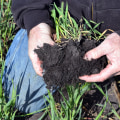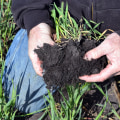Organic soil amendments are an important part of any successful gardening or farming project. They can help to improve soil structure, aeration, and nutrient availability, making it easier for plants to access the nutrients they need to grow. In addition, organic soil amendments can also help to reduce the impact of compaction and erosion. This article will provide an overview of the different types of organic soil amendments available, and discuss the benefits and drawbacks of each type. There are several types of organic soil amendments that can be used in gardens and landscapes.
Examples of these include compost, mulch, manure, and rock minerals. Compost is a combination of organic materials like leaves, grass clippings, kitchen scraps, and other decomposing materials. Adding compost to your soil will help improve its structure and provide additional nutrients. It also helps retain moisture in the soil and can reduce the need for chemical fertilizers.
Mulch is a layer of material such as straw, bark chips, or shredded leaves that is placed around plants to insulate them from extreme temperatures. Mulch also helps reduce weeds and conserve water by preventing evaporation. Manure is animal waste that is added to soil to provide organic matter and nutrients. Manure can come from cows, horses, chickens, and other animals.
It helps improve the structure of the soil and provides essential nutrients that plants need to grow healthy. Rock minerals are types of organic soil amendments that provide essential nutrients for plants. Rock minerals contain small amounts of nitrogen, phosphorus, and potassium that plants need to grow. They also help improve the structure and drainage of the soil.
Organic soil amendments are an important part of maintaining a healthy garden or landscape. Adding these materials to your soil will help provide essential nutrients and improve its structure. Understanding the different types of organic soil amendments will help you choose the best one for your particular needs.
Benefits of Organic Soil Amendments
Organic soil amendments have many benefits for gardens and landscapes. They can help improve the texture and structure of the soil, increase water retention, reduce the need for chemical fertilizers, and provide essential nutrients for plants.Organic soil amendments can improve the texture and structure of the soil by providing beneficial bacteria and fungi, which help break down organic matter and create a more porous soil structure. This increases air circulation, which in turn helps plant roots to absorb oxygen and moisture more effectively. The improved structure also helps to reduce soil compaction, which can lead to better water retention. Organic soil amendments can also help to reduce the need for chemical fertilizers.
By adding natural materials such as compost, manure, or green manures, you can provide essential nutrients to plants without relying on synthetic fertilizers. These organic amendments can also help to retain moisture in the soil, reducing the amount of water needed to keep plants healthy. Finally, organic soil amendments provide essential nutrients for plants. By adding organic material like compost or manure to the soil, you can provide beneficial bacteria and fungi that break down organic matter and release nutrients into the soil.
This helps to ensure that plants have access to the essential nutrients they need to thrive.
How to Use Organic Soil Amendments
When using organic soil amendments, it’s important to follow the directions on the packaging. Different types of amendments require different amounts of application, so it’s important to read the instructions carefully before applying them to your garden or landscape. Organic soil amendments are generally applied at a rate of one-half to one pound per 100 square feet of soil. The exact amount will depend on the type and condition of the soil and the desired results.For instance, compost can be applied at a rate of two to four inches deep, while a soil amendment like manure should be applied at a rate of one-inch deep. It’s important to consider the type of soil amendment you are using when determining how much to apply. Some amendments, such as manure, should be worked into the top few inches of soil, while others, such as compost, can simply be spread over the top. Additionally, some soil amendments can be applied directly to plants, while others should be mixed into the soil first. It’s also important to keep in mind that some organic soil amendments can be harmful if used in excess. For instance, manures and composts should not be used in large quantities as they can lead to nutrient burn and other issues.
It’s important to read the label and follow the instructions for the specific amendment you are using. Organic soil amendments are a great way to improve your soil’s nutrient content, water retention, and texture. When used properly, they can help your garden and landscape flourish and provide you with healthy, vibrant plants. Organic soil amendments are a great way to improve the health of your garden or landscape. They can provide essential nutrients for plants, improve the structure and texture of the soil, and increase water retention. By taking the time to evaluate the different types of organic soil amendments available, you can find the best one for your particular needs and ensure you get the most out of your garden or landscape. When using organic soil amendments, it's important to read the instructions carefully and use them as directed.
This will help ensure that you get the most out of your amendments and that your plants get the nutrients they need.











Leave a Comment